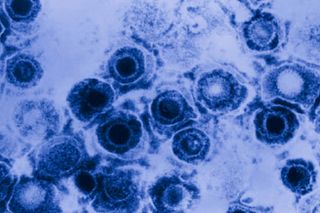
Everything You Need to Know About Genital Herpes
A primer on the STD you frequently can’t see, and can never cure.

Genital herpes (also known as genital warts) is an extremely common sexually transmitted infection, but one that people rarely discuss openly for fear of shame and stigma. But the more you know about sexual health, the more empowered your choices can be. Here are the basics on this very common STD.
What is genital herpes?
Genital herpes is the colloquial name for the herpes simplex virus (HSV), which can affect anyone who is sexually active (and even people who aren’t). Many people living with the disease may not exhibit symptoms, but even without displaying symptoms, they can still spread it to others. It is not curable, but there is medication that you can take to make living with it safer and more manageable.
There are two types of genital herpes, type 1 (HSV-1) and type 2 (HSV-2). Type 1 is a strain that mostly appears as sores around the mouth, but can be transmitted to genitalia through oral sex. Type 2 is genital only. So, both strains may appear as genital herpes, though type 1 may appear as either oral or genital herpes, depending on how it was contracted.
How is genital herpes transmitted?
Genital herpes is transmitted through sexual contact. You can get genital herpes through oral, genital, or anal sex with someone who is infected.
However, you can also get the virus in other ways. You can get the virus through contact with an active herpes sore, the saliva of someone who has the oral form of the virus (HSV-1), or through contact with the skin (either around the mouth or around the genitals) of someone who has a herpes infection.
Genital herpes is particularly dangerous because it can be spread by someone who isn’t showing any overt symptoms. It’s impossible to know whether your partner is infected with the virus. And oral herpes can be spread by contact with skin, so you can contract genital warts by engaging in oral sex with someone who has oral herpes.
You cannot get genital herpes from sharing toilets, towels, sheets, or from touching the same objects as someone who has the virus.
How prevalent is it? Is there a way to avoid it?
Herpes simplex is incredibly common. The most recent estimates by the World Health Organization put global infection rates somewhere at 50-67% for HSV-1 and 16% for HSV-2, though estimates are notoriously tricky because many people, especially with the type 2 virus, don’t even know they have it. And the WHO reports that infection rates in developing countries are generally much higher.
The only surefire way to avoid a herpes infection is to avoid sexual contact with anyone who has the virus.
But because it’s impossible to know whether someone is infected just by looking at them (or their genitalia), the best thing you can do is ensure your partner is tested for STDs and is herpes-free. Alternatively, you can use condoms — correctly — to reduce the chances of transmission. However, because the virus is transmitted through contact with the skin, even condoms are not capable of fully protecting against infection, as skin-to-skin contact can happen in areas that are not covered by a condom.
If you or your partner already has the virus, speak to a healthcare provider about anti-herpes medication, which can help to curb the chances of transmission (see more about this below).
What are the symptoms of genital herpes?
The only real symptom of genital herpes is the appearance of painful sores in the genital area. However, keep in mind that many people who are infected with the virus rarely show visible signs of infection.
How do you get diagnosed?
Doctors can test for the virus by either taking a sample of skin from a herpes sore, or by doing a simple blood test.
What is the treatment for genital herpes?
The only treatment is a medication, taken daily, which can reduce the chances of sore outbreaks. It’s important to note that this medication does not prevent you from transmitting the infection to others, which is why it’s so important to keep any sexual partners informed of your status, and to use protection fastidiously.
Can genital herpes be cured?
In short, no. Once you contract the virus, you cannot be “cured.” However, you can take medication that reduces the chances of outbreaks, which reduces the chances of transmission.
Furthermore, open herpes sores can make it easier to contract other diseases (such as HIV) through the open sores on the skin, so it’s essential to seek diagnosis and continue treatment to minimize the frequency of outbreaks.
Anything else I should know?
If you are pregnant or planning to get pregnant, be sure to discuss a herpes infection with your doctor. A herpes infection can make miscarriage or preterm birth more likely. But more importantly, giving birth to a baby during an outbreak is very dangerous; infants who contract the virus during childbirth are at very high risk for serious complications, and possibly death.
This is part of our series on sexually transmitted infections.
Related


In India, C‑section Delivery Rates Doubled in 10 Years
